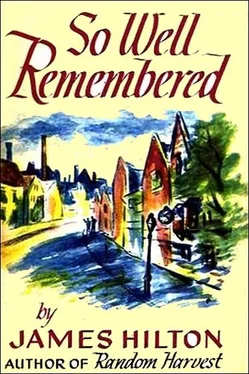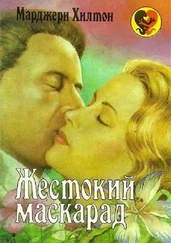Джеймс Хилтон - So Well Remembered
Здесь есть возможность читать онлайн «Джеймс Хилтон - So Well Remembered» весь текст электронной книги совершенно бесплатно (целиком полную версию без сокращений). В некоторых случаях можно слушать аудио, скачать через торрент в формате fb2 и присутствует краткое содержание. Год выпуска: 1945, Жанр: Проза, на английском языке. Описание произведения, (предисловие) а так же отзывы посетителей доступны на портале библиотеки ЛибКат.
- Название:So Well Remembered
- Автор:
- Жанр:
- Год:1945
- ISBN:нет данных
- Рейтинг книги:5 / 5. Голосов: 1
-
Избранное:Добавить в избранное
- Отзывы:
-
Ваша оценка:
- 100
- 1
- 2
- 3
- 4
- 5
So Well Remembered: краткое содержание, описание и аннотация
Предлагаем к чтению аннотацию, описание, краткое содержание или предисловие (зависит от того, что написал сам автор книги «So Well Remembered»). Если вы не нашли необходимую информацию о книге — напишите в комментариях, мы постараемся отыскать её.
So Well Remembered — читать онлайн бесплатно полную книгу (весь текст) целиком
Ниже представлен текст книги, разбитый по страницам. Система сохранения места последней прочитанной страницы, позволяет с удобством читать онлайн бесплатно книгу «So Well Remembered», без необходимости каждый раз заново искать на чём Вы остановились. Поставьте закладку, и сможете в любой момент перейти на страницу, на которой закончили чтение.
Интервал:
Закладка:
“Aye,” answered George, unconsciously giving his voice a riper Browdley burr to match the other’s. “Ye’re queer enough. And I suppose ye think I’M queer for wanting Browdley to have a park?”
“Oh, to blazes with the park—are we on that again?… I hear ye’ve got a baby.”
George nodded. “A boy.”
“Let’s hope it takes after you, then. Because I’ll tell ye this, Boswell, the Channings are queerer than you and me combined… Must ye go?”
“Getting late,” said George, with a smile.
“Drop in again some time.”
“Aye… but I won’t promise not to mention that park.”
George did not tell Livia about his visit, because he felt it would not please her, however well he could justify it. And a few weeks later he visited Richard again, partly in case there was any change of mind about the park, but chiefly because he was passing the house and was touched by a sudden vision of the old man’s loneliness in that upstairs room with no one to talk to but a deaf servant. A moment later, having acted on impulse, he was touched again by the evident warmth of Richard’s welcome.
“Sit down, lad, and make yourself at home… See this?” And he waved, of all things, a cheque he had been busy writing. “I’m givin’ it away for charity… Doesn’t it make your mouth water?”
George laughed, while Richard went on to explain that he was sending it to a man he did not know, but whose name and address had appeared in that morning’s paper—some fellow who had grown a hollyhock taller than his house. “Mebbe ye’ll drop it in the post for me when ye go, Boswell. He’ll get a nice surprise when he opens my letter tomorrow… Well, what are ye starin’ at me for? D’ye think I’m daft? Or don’t ye like hollyhocks taller than houses?”
“I like ‘em all right,” answered George, “and houses too. I’ll count it as one of your BETTER benefactions. Why didn’t ye make it a bit more, though? What’s a pound from you?”
Whereat Richard enjoyed the best laugh he had had for years, for despite his reputation for being tight with money, no one had dared to hint it to his face until George, in sheer na veté, stumbled into doing so. But it made such an instant hit that George was never quite sure afterwards whether he kept it up out of candour or to give the old man more fun.
For he formed quite a habit of dropping in to see Felsby, whose house was not far from the Town Hall. The visits did not have to be long ones, and George enjoyed their brevity as much as the outspokenness of what was said on both sides.
“The trouble with you, George, is that ye think too much of yourself. I always thought ye did, ever since ye got on the Council. I’ve sacked hundreds of better men than you for a tenth of the things ye’ve said to me tonight.”
“Aye,” retorted George. “And ye’d sack me too, if I was an employee of yours. But I’m not. My father was, though, for the best part of a lifetime. Or the worst part, whichever way ye look at it.”
That sort of thing…
(George reflected afterwards that the old man must like it, or he would get offended; but then it occurred to him that he would have got offended already, if he had thought that George really meant what he said, but he doubtless supposed he didn’t. Yet George DID, in a way, and knowing this, found himself up against a familiar dilemma: that to say what you mean without ever offending people is usually to say what you mean without making them believe you mean what you say—and what was the use of that? Well, maybe SOME use, sometimes. For, as a victim expressed HIS side of it once: “George tells you what a bastard you are, and you laugh, and then after he’s gone you suddenly say to yourself—‘Of course, George was only joking—it’s a good job he doesn’t really know I AM a bit of a bastard!’”)
Richard was frank enough also. He once said: “George, I’m sorry for ye, married to a Channing. Her father was no good, and her mother wasn’t much better, and the life she lived at Stoneclough that last year before he died —well, it was no Sunday-school picnic, believe me.”
It was impossible to resent this, in its context, yet George felt impelled to answer defensively: “Oh, Livia’s all right”—before curiosity made him add: “She had a bad time, you mean?”
Richard Felsby said impressively: “There’s only one man who could have told you—and that’s Dr. Whiteside, and he’s dead. He never told me, for that matter—but I knew how he felt, because I remember what he said when he got news of her father’s death—‘Thank God,’ he said, ‘for everybody’s sake.’… Well, well—maybe that’s more than I should have passed on. But I’ll tell ye this, George—the Channing blood’s had a streak of moonshine in it lately. That’s what made me leave the firm. I found I was getting too sensible for it.”
“You’re not as sensible as you think,” retorted George, allowing the conversation to become bantering again. He guessed it would be good policy not to press his enquiries at this stage, especially as the old man would doubtless return to the subject at a later meeting and tell all he knew. George had had enough experience of wheedling information to know that an air of not too much concern is the best wheedler. And besides, he must keep in mind the other object of his wheedling. So he added, still banteringly: “If ye WERE sensible ye’d give me that land for a park. Think of the taxes ye’d save.”
At which the old man shook and spluttered with merriment to a degree that quite possibly imposed a strain on his heart.
Suddenly it all came to an end.
Livia found out about the more or less regular visits and flew into the kind of tantrum that George had certainly not anticipated; if he had, he would doubtless not have called on Felsby in the first place. He had been prepared for her coolness over the association, but he was amazed to discover how profoundly the whole thing must matter to her. “Oh, George,” she cried, as if she had discovered him in some mortal sin, “how COULD you do it? I HATE him—I don’t want to have anything to do with him. You knew that. And to think that secretly—all the time—so that I only got to hear of it by accident—”
Perhaps because he did feel a little guilty in that one respect, he was more than usually ready to defend himself. “Nay, let’s keep a sense of proportion, Livia. No harm’s been done to anyone just because I’ve had a few chats with an old man—even if you do count him an enemy for some reason I’ve never been told about. Besides, I went to him chiefly on business —I wanted him to give the town a park.”
“Oh, George, what does a park matter?”
“Just what HE said.”
“The main thing is, you must never, NEVER go there again.”
George stared at her, for the first time in his life, with a look of disenchantment.
“I couldn’t promise that, Livia.”
“WHAT?” And she was facing him, the issue suddenly alive between them.
“I’m sorry, Livia. I don’t like to upset you, but I’ve got to think of the town’s interests. If you know what I mean.”
“Oh yes, I know. I didn’t know—but that’s unimportant. It makes no difference.”
(She knew what? What was it she hadn’t known? What was unimportant? What made no difference? He was by now accustomed to the mental gymnastics that her talk often demanded; she spoke in a sort of verbal shorthand, so that one had to grab at the meaning as it flashed by, and even then not be sure of getting it. Basically, he felt it to be a species of natural arrogance; she used the dotted line of her own immediate thoughts and expected others to follow her without that advantage.)
Читать дальшеИнтервал:
Закладка:
Похожие книги на «So Well Remembered»
Представляем Вашему вниманию похожие книги на «So Well Remembered» списком для выбора. Мы отобрали схожую по названию и смыслу литературу в надежде предоставить читателям больше вариантов отыскать новые, интересные, ещё непрочитанные произведения.
Обсуждение, отзывы о книге «So Well Remembered» и просто собственные мнения читателей. Оставьте ваши комментарии, напишите, что Вы думаете о произведении, его смысле или главных героях. Укажите что конкретно понравилось, а что нет, и почему Вы так считаете.










